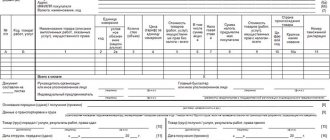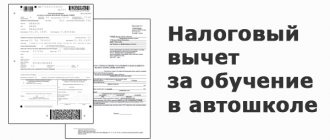Tax deductions for VAT are a benefit for the company, but if you get carried away with them, you can get close attention from the state instead of saving money.
To avoid such a reversal, many carry forward part of the refund to subsequent tax periods. However, it is important not to forget about a number of nuances. For example, although a deduction can be declared within 3 years after registration of purchased goods and services, some transactions do not fall under this rule.
In order to obtain maximum tax savings, it is advantageous to claim VAT deductions as early as possible. But there is also a certain amount of “safe deductions”. At the federal level, the share of VAT and deductions for it is assessed in accordance with the norms of Order of the Federal Tax Service of the Russian Federation dated October 14, 2008 No. MM-3-2 / [email protected] Appendix 2 to the order states that the share of VAT deductions should not account for 89 % (or more) of tax liabilities calculated for 12 months.
An additional guideline can be regularly updated data on the tax burden by country and region. You can get acquainted with them on the website of the Federal Tax Service of Russia.
Some taxpayers do not seek to once again claim a VAT refund if this is possible in another period where there is an amount of tax to be paid. Thus, the taxpayer will not face a full-fledged desk audit that will check the legality of claiming large deductions.
General conditions for VAT deduction
According to paragraph 1 of Art. 171 of the Tax Code of the Russian Federation, the taxpayer has the right to reduce the total amount of tax calculated in accordance with Art. 166 of the Tax Code of the Russian Federation, as established by Art. 171 of the Tax Code of the Russian Federation, tax deductions. The taxpayer has the right to claim VAT for deduction in the period in which all the general conditions provided for in Art. 171, 172 Tax Code of the Russian Federation:
- goods (work, services, property rights) were acquired for the implementation of transactions subject to VAT (clause 2 of Article 171 of the Tax Code of the Russian Federation);
- goods (work, services, property rights) are accepted for accounting (clause 1 of article 172 of the Tax Code of the Russian Federation);
- there is a correctly executed invoice from the seller or a universal transfer document (clause 2 of article 169, clause 1 of article 172 of the Tax Code of the Russian Federation).
Let us remind you that the tax period for VAT is a quarter (Article 163 of the Tax Code of the Russian Federation). As a general rule, a taxpayer can declare VAT for deduction in the quarter (Article 163 of the Tax Code of the Russian Federation) in which all the mandatory conditions for this are met.
The main reason why the inspectorate may refuse to deduct VAT is failure to comply with any of the conditions for accepting the tax for deduction (clause 2 of Article 169, clauses 1, 2 of Article 170 of the Tax Code of the Russian Federation). This will leave you with a tax liability. In this case, the inspectorate may charge the taxpayer:
- fine under art. 122 Tax Code of the Russian Federation;
- penalties under Art. 75 of the Tax Code of the Russian Federation for each day of delay.
The taxpayer will not be able to take into account the VAT accrued based on the results of the audit in income tax expenses (this follows from the analysis of paragraph 1 of Article 170, paragraph 19 of Article 270 of the Tax Code of the Russian Federation). For some transactions, additional conditions are provided for the deduction of VAT, namely:
- the taxpayer must transfer the tax to the budget (clause 1 of Article 172 of the Tax Code of the Russian Federation);
- To accept a VAT deduction on property (intangible assets, property rights) received in the form of a contribution to the authorized capital, the participant (shareholder) must restore the tax to the budget when making the contribution (clause 11 of Article 171 of the Tax Code of the Russian Federation).
For some operations, special conditions are established, in particular:
- To deduct VAT from the buyer on an advance payment issued, the following are required (clause 12 of Article 171, clause 9 of Article 172 of the Tax Code of the Russian Federation): a correctly executed advance invoice from the seller with the allocated amount of VAT; an agreement in which there is a condition on the transfer of an advance; payment order for the transfer of an advance;
- To deduct VAT from the seller on an advance received, a prerequisite is the shipment of the goods or the return of the advance to the buyer (clause 1 of Article 154, clauses 5, 8 of Article 171, clauses 4, 6 of Article 172 of the Tax Code of the Russian Federation);
- to deduct VAT accrued on the volume of construction and installation work for one’s own needs, it is mandatory (clause 6 of Article 171, clause 5 of Article 172 of the Tax Code of the Russian Federation, clause 20 of the Rules for maintaining a purchase book, clause 3, 21 of the Rules for maintaining a sales book): draw up an invoice for completed construction and installation work and register it in the purchase book and sales book; use an economically constructed object in activities subject to VAT (including partially); depreciate the cost of the object for income tax purposes (or otherwise account for expenses);
- To deduct VAT by organizations that compensate foreigners for tax under the tax free system, two conditions must be met (clause 4.1 of Article 171, clause 11 of Article 172 of the Tax Code of the Russian Federation): have a document (check) with a mark from the customs authority of the Russian Federation; actually pay compensation to the foreigner;
- to deduct VAT in case of purchasing services in electronic form from a foreign organization (including from a foreign intermediary organization recognized as a tax agent) are needed (clause 2.1 of Article 171 of the Tax Code of the Russian Federation, Letter of the Federal Tax Service of Russia dated May 14, 2019 No. SD-4- 3/ [email protected] ): an agreement or settlement document indicating the amount of VAT, INN and KPP of a foreign organization; documents for transfer of payment, including the amount of VAT.
In particular, a special procedure for applying VAT deductions is established in paragraph 3 of Art. 172 of the Tax Code of the Russian Federation in relation to operations for the sale of goods (work, services) taxed at a rate of 0%, listed in paragraph 1 of Art. 164 Tax Code of the Russian Federation.
Special deadlines for accepting VAT for deduction are provided for the export of raw materials, if you apply a zero rate. In this case, you have the right to deduct the “input” VAT (clauses 9, 10 of Article 165, clause 9 of Article 167, clause 3 of Article 172 of the Tax Code of the Russian Federation):
- or on the last day of the quarter in which you confirmed the right to apply a zero rate for the transaction (collected documents within 180 days from the date of placing the goods under the customs export regime);
- or on the day of shipment of goods, if you have not collected supporting documents within 180 days.
Exporters of non-commodity goods claim deductions within the general deadlines.
Transfer of deduction to 1C
Since the release of 3.0.67 Accounting 8, the VAT Assistant
, which can “transfer” deductions of input VAT. The assistant starts:
- through Reports – VAT – VAT reporting;
- from the Task List
; - in processing Closing the month
; - when creating a VAT return for the tax period for the first time.
VAT Assistant can:
- control the completeness of the details required to fill out the declaration;
- track errors in VAT accounting (express check);
- transfer the VAT deduction when exceeding the safe share established
by clause 3 of Appendix No. 2 to the Order of the Federal Tax Service of the Russian Federation dated May 30, 2007 N MM-3-06/ [email protected]
; - create a purchase book and a sales book;
- fill out the declaration taking into account control ratios;
- fill out payment orders in the amount of 1/3 of the tax payable.
Attention! The VAT rate has been changed from 01/01/2019 from 18% to 20% and from 18/118 to 20/120.
Organization for the fourth quarter of 2022:
- issued a SF in the amount of: sales - 295,000 rubles. (including VAT 18% - 45,000 rub.),
- advances received – 8,260 rubles. (including VAT 18% - 1,260 rubles);
- received SF in the amount of:
- acquisitions from:
LLC "Svet-Svyaz" - 70,800 rubles. (including VAT 18% – RUB 10,800),
- LLC Business – 200,600 rubles. (including VAT 18% – RUB 30,600);
- advances issued – 59,000 rubles. (including VAT 18% - 9,000 rubles).
For simple VAT accounting:
Transferring the deduction to another period
Article 173 of the Tax Code of the Russian Federation talks about the possibility of claiming a VAT deduction within a three-year period from the end of the relevant period. This norm applies to all types of deductions, unless otherwise established by the Tax Code of the Russian Federation itself.
The Ministry of Finance of the Russian Federation has repeatedly explained in a number of letters that the VAT deductions listed in Art. 171 of the Tax Code of the Russian Federation, should be classified into two categories:
1. Deductions specified in paragraph 2 of Art. 171 of the Tax Code of the Russian Federation, which can be claimed within 3 years after registration of goods, works or services by a VAT payer.
2. Other deductions under Art. 171 of the Tax Code of the Russian Federation are applicable only in the tax period in which the taxpayer has met the conditions provided for in Art. 171 and 172 of the Tax Code of the Russian Federation.
In particular, this position is expressed in letters dated July 14, 2020 No. 03-07-14/61018, dated April 10, 2019 No. 03-07-11/25201, dated January 26, 2018 No. 03-07-08/4269 and a number of others.
Transfer of deduction to 1C
If necessary, you can adjust the amount of VAT deduction:
For complex accounting:
- separate accounting,
- export,
- import,
- transactions N/A for VAT,
- other operations with VAT accounting features.
See also:
- Accounting policy for taxation: VAT tab
- How to keep separate accounting of incoming VAT in 1C if there are transactions subject to VAT and not subject to VAT
- 5 percent rule for input VAT in 1C
- Error switching to Separate VAT accounting
- How to distinguish suspended VAT from VAT, the deduction for which has been postponed (3 years)
- Processing Registration of advance invoices
- Is it possible to transfer the VAT deduction for 3 years on purchased fixed assets?
- VAT recovery
- Restoration of VAT when writing off inventory items
- Payment of a share in the authorized capital by property contribution (OS
- Implementation log setting
- Triple check of VAT return
- [12/24/2018 entry] Review of annual reports for 2022.
Did the article help?
Get another secret bonus and full access to the BukhExpert8 help system for 14 days free of charge
Related publications
- Transfer of VAT deduction for unconfirmed exports...
- The problem of distributing VAT deductions for 3 years (from the recording of the online seminar on May 22, 2022) You do not have access to view To gain access: Complete a commercial...
- Opportunities for investment deductions from 2022...
- Is a cash receipt not enough to deduct VAT when purchasing postal services? According to the Ministry of Finance, VAT paid for postal services is not accepted...
Transfer of deductions for goods, works, services and property rights
The VAT deduction should generally be received during the period in which the right to it arises. It is important to note that the deduction can only be claimed after receiving an invoice from the supplier .
If the invoice was received before the 25th day of the first month of the next quarter (that is, before the deadline established by paragraph 5 of Article 174 of the Tax Code of the Russian Federation for submitting a VAT return), tax deduction can be made in the quarter in which the goods are accepted for accounting. works, services or property rights (Clause 1.1 of Article 172 of the Tax Code of the Russian Federation, Letter dated 02/14/2019 No. 03-07-11/9305). If the invoice is received after the deadline for filing the declaration, VAT can be deducted only during the period of receipt of the invoice, but no later than 3 years from the date of acceptance of the relevant purchase for accounting.
Clause 1.1 art. 172 of the Tax Code of the Russian Federation allows the transfer of this tax deduction subject to general conditions. In paragraph 2 of Art. 171 of the Tax Code of the Russian Federation determines that deductions for goods, works, services, and property rights acquired by a taxpayer in the territory of the Russian Federation can be claimed in tax periods within 3 years after they are registered, but before established by Art. 174 of the Tax Code of the Russian Federation, the deadline for submitting a tax return for the specified tax period.
Transferring a tax refund is not difficult: you need to set aside the invoice (adjustment invoice, AIT), on the basis of which the deduction is granted, and register it in the purchase ledger in the quarter when the company decided to implement the refund. Before this, the document is not registered in the purchase book, and the tax amount is not indicated in the VAT registers and in the declaration.
A deduction for one invoice can be claimed in parts in different periods (letters of the Ministry of Finance of the Russian Federation dated 09/04/2018 No. 03-07-11/63070, dated 01/26/2018 No. 03-07-08/4269).
How to count three years for VAT deduction
The period during which the right to deduction will not be lost expires on the last day of the quarter in which the end of the 3-year period falls. It cannot be extended by 25 days allotted for filing a VAT return at the end of the quarter. In this case, the 3-year period is interrupted.
Example. How to determine the deadline for deducting VAT
The company bought a fixed asset on August 10, 2022, and registered it in the same month.
All conditions for the deduction were met in the 3rd quarter of 2022. But the VAT deduction for this purchase was declared. They decided to fill the gap in 2022. The 3-year period for claiming the right to deduction will expire on September 30, 2022. If you file your return on October 25, 2022, the deduction will be denied. A similar position is expressed in the ruling of the Constitutional Court of the Russian Federation dated March 24, 2015 No. 540-O. The three-year deadline for deducting VAT is not extended by the 25 days provided for filing a tax return.
So how can you maintain the right to deduct an invoice issued 3 years ago, for example, in August 2022? You need to do the following:
- register an invoice in the purchase book for the 3rd quarter of 2021;
- declare the deduction in the declaration for the 3rd quarter of 2022 and submit it no later than September 30, 2022.
Only in this way will the 3-year deadline for deduction be met.
"Import" VAT
Amounts of VAT paid at customs (“import” VAT) when importing goods into the territory of the Russian Federation are subject to deduction in the event of the acquisition of these goods for transactions subject to VAT (clause 2 of Article 171 of the Tax Code of the Russian Federation and clause 1 of Article 172 of the Tax Code of the Russian Federation ). At the same time, such a deduction can be claimed within 3 years after the acceptance of these goods for registration (clause 1.1 of Article 172 of the Tax Code of the Russian Federation). In letters, the Ministry of Finance of the Russian Federation spoke positively about the deduction of “import” VAT in parts in different tax periods.
This rule applies to VAT deductions (clause 2 of Article 171 of the Tax Code of the Russian Federation): paid when importing goods into the territory of the Russian Federation in customs procedures of release for domestic consumption, processing for domestic consumption, temporary import and processing outside the customs territory; paid when importing goods into the Russian Federation that are moved across its customs border without customs clearance.
Transfer of deductions when purchasing fixed assets
In paragraph 3 of Art. 38 of the Tax Code of the Russian Federation defines that a product for tax purposes is any property that is sold or intended for sale, including fixed assets and intangible assets.
But, according to financiers, clause 1.1 of Art. 172 of the Tax Code of the Russian Federation does not apply to fixed assets and intangible assets, as well as to equipment for installation. In doing so, they refer to paragraph 1 of Art. 172 of the Tax Code of the Russian Federation, which provides for a full refund of VAT after these assets are accepted for accounting. Therefore, VAT on acquired fixed assets and intangible assets cannot be carried forward to future periods. The regulatory authorities interpret the phrase “in full after registration” in such a way that the VAT deduction must be applied at once immediately after the object is accepted for registration and another method of deducting VAT (including transfer to the future) is not permissible.
Please note that from the beginning of 2022, a rule has been introduced: for goods and rights acquired for the purpose of creating intangible assets, deductions can be claimed after these goods are accepted for accounting, that is, before the actual creation of intangible assets and reflection of its value on account 04. But about the transfer There is no question of deduction here.
An exception is the possibility of transferring VAT refunds for capital construction (clause 6 of Article 171 of the Tax Code of the Russian Federation). According to experts, VAT refunds can also be transferred in parts (letters from the Ministry of Finance dated September 12, 2017 No. 03-07-10/58705, Federal Tax Service dated April 11, 2018 No. SD-4-3 / [email protected] ). This is due to the fact that the amounts of deductions for capital construction are very significant and their even distribution is beneficial to the budget.
New rules for attributing VAT that is not deductible
There are some changes in legislation that should be taken into account when writing off VAT on expenses. Previously written off VAT, which was not accepted for refund, was charged as expenses and included in the price of goods.
According to the new wording of Article 170, the write-off of VAT applied to expenses is carried out differently. If the fee is not deductible, it is taken into account in the cost of goods, including fixed assets and intangible assets.
This rule applies to objects used in carrying out operations exempt from the fee, applies to the sale of goods outside the Russian Federation, and is used when purchasing goods by firms that have the right not to pay a fee using the exemption.
Moreover, if an organization conducts taxable and non-taxable activities, then it must carry out separate accounting of the input tariff. Tax on products used for activities subject to the tariff is deductible. If the tax applies to a preferential product, it increases its cost.
Reimbursement of VAT on capital construction in installments
The position on the deduction of VAT on fixed assets is very controversial, although it is based on the text of the norms of the Tax Code of the Russian Federation. An example of this is the Resolution of the Administrative Court of the North Caucasus District dated June 18, 2020 in case No. A25-171/2019. The court concluded that the company has the right to claim a deduction for a fixed asset in installments in tax periods following the period when the fixed asset was accepted for accounting.
The essence of the matter: the company acquired a non-residential building. The seller issued an invoice for the transaction in the second quarter of 2015. The company declared VAT on this invoice for deduction in parts - in the fourth quarter of 2016 and the first quarter of 2022. When checking the VAT return for the first quarter of 2022, the tax authority refused to deduct. In his opinion, paragraph 1 of Art. 172 of the Tax Code of the Russian Federation does not provide for the deduction of VAT on the basis of one invoice in parts in different periods. As a result, the company was charged additional VAT and was held liable under clause 1 of Art. 122 of the Tax Code of the Russian Federation for failure to pay taxes on time.
The company did not agree with this and went to court with a demand to declare the refusal to deduct unfounded. Decision of the first instance and appeal The courts of the first and appellate instances supported the tax authorities. They indicated that the procedure for presenting VAT for deduction is determined by Art. 166, 169, 171, 172, 176 Tax Code of the Russian Federation. This procedure does not establish the right of the taxpayer to split the deduction based on one invoice into parts in different tax periods and choose the period in which to claim the tax deduction. The right to submit VAT for deduction within a three-year period provided for by the Tax Code does not imply the right to split the VAT issued in one invoice.
According to the courts, by claiming a deduction on one invoice in different tax periods, the company thereby artificially forms the tax base for VAT, and does not determine it according to actual business transactions. From the provisions of the Tax Code of the Russian Federation it follows that VAT on the building should have been accepted for deduction by the company in the second quarter of 2015.
Position of the cassation: The court of cassation indicated that the conclusion of the courts does not comply with the norms of the current tax legislation. Article 172 of the Tax Code of the Russian Federation, which determines the procedure for applying tax deductions, does not exclude the possibility of deducting VAT outside the tax period in which fixed assets are registered (Resolution of the Presidium of the Supreme Arbitration Court of the Russian Federation dated January 31, 2006 No. 10807/05). This article contains only a clarification on the temporary condition for compliance with the tax deduction for fixed assets - not earlier than the period when these fixed assets are registered. The specified norm does not contain a prohibition on deducting VAT in parts.
The Court of Cassation noted that the application of tax deductions in parts outside the tax period when such a right arose does not lead to non-payment of tax to the budget, since the application of a tax deduction in this manner entails an overpayment of tax in previous tax periods. Article 172 of the Tax Code of the Russian Federation establishes only the scope of the taxpayer’s rights and does not establish the maximum or minimum amount of VAT deduction. Consequently, the company has the right to apply a deduction for one invoice in different tax periods that occurred after the fixed asset was accepted for accounting.
The conclusion of the courts that the company deliberately chose the period for claiming the deduction does not correspond to the legal nature of the tax deduction, since the transfer of the deduction is the right of the taxpayer. Thus, a company cannot be denied the right to claim a deduction for fixed assets only on the grounds that the deduction is claimed in subsequent tax periods within 3 years and in parts (that is, the deduction for one invoice is split into several tax periods). As a result, the cassation court found the tax inspectorate’s refusal to deduct unfounded.
Registration
In relation to VAT, a tax benefit (receiving a tax deduction) can be considered unjustified in two cases:
- or if the unreality of the disputed business transaction is proven;
- or the taxpayer’s carelessness in choosing a problematic counterparty.
The tenant does not need monthly acts for the provision of services in order to claim VAT deduction on rental payments. One invoice is enough, where VAT is highlighted as a separate line. Therefore, a deduction can be claimed on the basis of an invoice and in the absence of monthly statements.
But if there is no invoice (including due to loss), then there will be no deduction.
If instead of the original invoice you have a duplicate, you will not be able to claim VAT deduction on it. The Tax Code does not provide for such a possibility.
An invoice, on the basis of which the buyer accepts for deduction of VAT presented by the seller, can be issued on paper or in electronic form (clause 1 of Article 169 of the Tax Code of the Russian Federation).
Clause 3 of the procedure for issuing and receiving invoices in electronic form via telecommunication channels, approved by Order of the Ministry of Finance dated February 5, 2022 No. 14n, establishes that electronic invoices are issued and received through EDI operators that exchange electronic documentation via TCS.
In this case, electronic invoices are issued if both parties agree and they have the technical ability to work with documents in this form.
Accordingly, an electronic invoice received through an EDI operator via TKS is the basis for the buyer to accept tax as a deduction. In this case, the invoice must comply with the requirements established by Article 169 of the Tax Code of the Russian Federation (letter of the Ministry of Finance dated December 22, 2022 No. 03-07-09/104829).
Forms of documents established by federal laws other than the Accounting Law No. 402-FZ are mandatory.
A bill of lading (BW) is issued upon concluding a contract for the carriage of goods. It confirms the conclusion of this agreement and is a mandatory document, regardless of the fact of execution of any other documents.
In the general case, the TN is the shipper (Clause 2 of Article 785 of the Civil Code of the Russian Federation, Part 1 of Article 8 of the Federal Law of November 8, 2007 No. 259-FZ “Charter of Road Transport and Urban Ground Electric Transport”).
The TN acts as a transportation document and serves as evidence of the existence of a legal relationship between the sender of the cargo and the carrier. It determines the conditions of transportation.
The use of a technical form does not exclude the possibility of using a consignment note (TTN) as a primary accounting document (see letters of the Ministry of Transport dated July 20, 2011 No. 03-01/08-1980is, Ministry of Finance dated December 22, 2011 No. 03-03- 10/123).
The waybill (BW) is intended to record the movement of inventory items and payments for their transportation by road. The goods section of the CTN is used to write off inventory items from shippers and capitalize them from consignees.
The transport section is used to record transport work and settlements between shippers or consignees with organizations that own vehicles for cargo transportation services.
Tax officials note that a document confirming the fact of expenses incurred for the transportation of goods can be any of these two documents - both TN and TTN (see, for example, letter of the Federal Tax Service dated March 21, 2012 No. ED-4-3/ [ email protected] ).
This means that if there is only one of these documents, this will not serve as an unconditional basis for refusing to deduct VAT. But in combination with other circumstances in court, this may become additional evidence of the fictitiousness of the transaction (see Determination of the Supreme Arbitration Court of the Russian Federation dated August 2, 2012 No. VAS-9945/10).
But it happens that waybills (TN and/or TTN) are not needed at all:
- if the buyer does not enter into a transportation contract and does not bear delivery costs;
- if the shipping cost is included in the price of the product.
In these cases, the absence of transport invoices does not affect the deduction of VAT presented by the supplier of goods (see, for example, resolutions of the Fourth AAS dated January 20, 2015 No. 04AP-6785/14, FAS of the North Caucasus District dated February 18, 2013 No. F08-258/13, etc.).
The letter of the Ministry of Finance dated October 30, 2012 No. 03-07-11/461 also states that if the taxpayer is not the customer of the transportation and accepted the goods for registration on the basis of the consignment note in the TORG-12 form, due to the lack of a TTN in he will not be denied VAT deduction on purchased goods.







